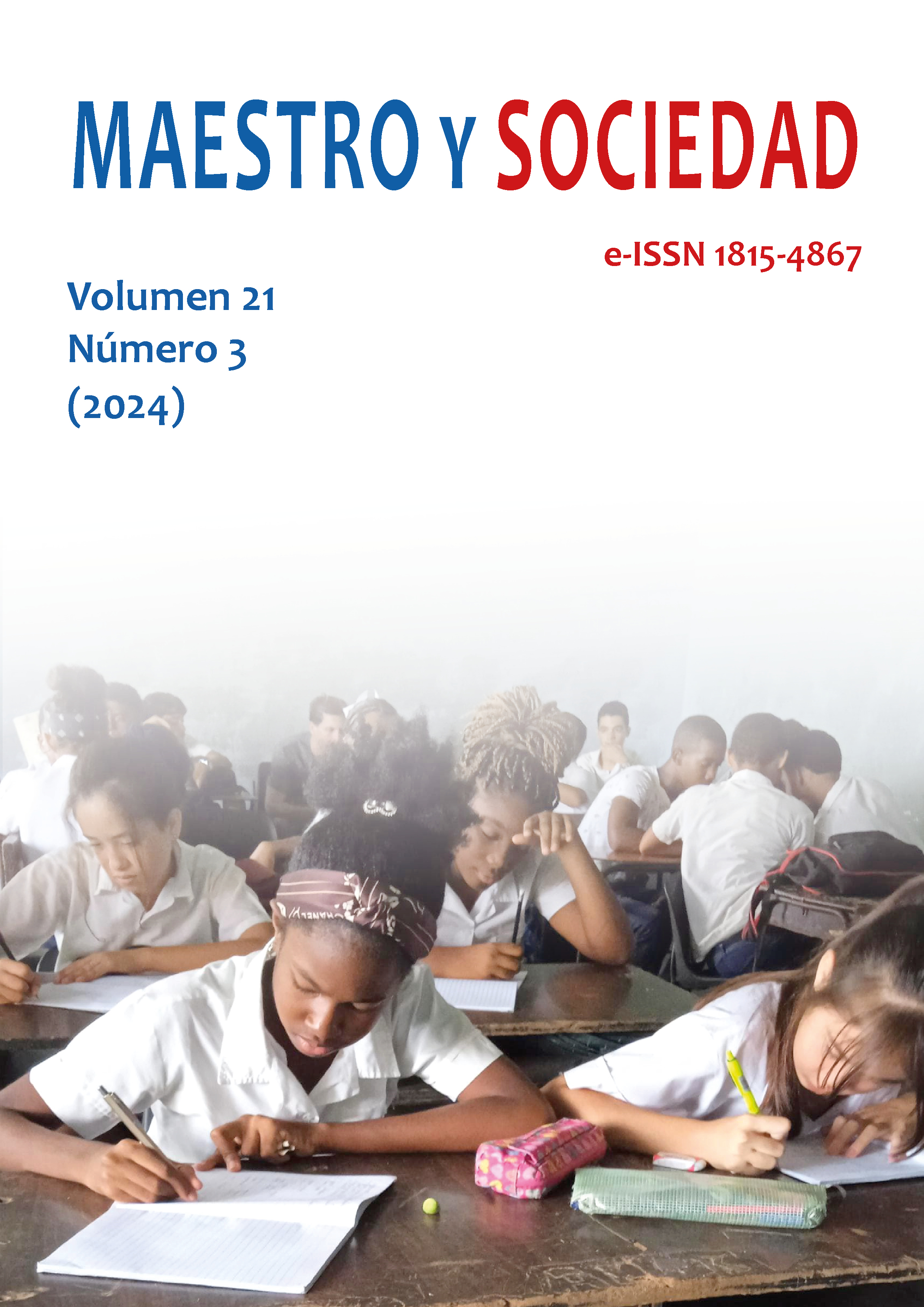The orientation to the family for the attention to difficulties of the behavior in students of the Basic General Education
Keywords:
family guidance, school-family, student behavior, General Basic Education.Abstract
Introduction: School and family are two educational agencies whose links are decisive for the success of the formative process; family guidance as part of educational guidance plays a fundamental role in education, for this reason the subject has been widely addressed in professional pedagogical practice and in educational research, but it is not exhausted, there are still insufficiencies that are evident in the behavior of students; specifically in the 5th grade of the Jorge Amable Quezada Pinzón Educational Unit, there are insufficiencies in the school-family link. This situation motivated the authors to investigate with the objective of designing a family educational guidance strategy to contribute to improve the behavior of students. Materials and methods: For its development, different methods and techniques were used such as observation, interviews and surveys, the feasibility of the contribution was corroborated through a socialization workshop and action research. Results: The proposed strategy showed effectiveness in the use of projective techniques with students and the instructional material for the family guidance process to improve student behavior. Discussion: The development of the socialization workshop and the partial implementation through action research with a group of 17 students from the Prof. Jorge Amable Quezada Pinzón Educational Unit in Ecuador allowed us to verify its feasibility and relevance, and its potential, which were integrated into the educational work system for this school level from the cooperative work between educators, directors and family members in order to achieve better student behavior. Conclusions: The designed actions favored behavior, motivating students and parents, especially those associated with the development of projective techniques with students and the instructional material made available to parents. Both stimulated successful behavior, becoming a novel experience that facilitates the educational work of the school.
References
Borja, C., Brunal, A. y Osorio, S. (2018). Rol y sentido del orientador educativo en ámbitos escolares en Rol y sentido del orientador educativo en ámbitos escolares en Colombia. SED, IDEP, RELAPRO.
Cabrera F. J., Apa, Y. y Escobar, A. (2020). La orientación educativa y los presupuestos de la función orientadora de profesionales de la educación. Revista Atlante: Cuadernos de Educación y Desarrollo (1). https://www.eumed.net/rev/atlante/2020/01/orientacion-educativa-presupuestos.html
Campos Barrionuevo, B. (2020). La familia como agente interactivo en los procesos educativos. Factor de Inclusión y calidad escolar(es) I. Revista de Educación Inclusiva, 13(2), 213-237.
Calvo, M., Verdugo, M. Á., & Amor, A. M. (2016). La participación familiar es un requisito imprescindible para una escuela inclusiva. Revista latinoamericana de educación inclusiva, 10(1), 99-113.
Castañeda Mota, M. M. (2022). La cientificidad de metodologías cuantitativa, cualitativa y emergentes. Revista Digital de Investigación en Docencia Universitaria, 16(1).
Cedeño, M. y Zambrano, A. (2020). La orientación familiar desde la escuela y su atención a la diversidad. Revista Pol. Con., 5(8), pp. 774-797.
Lucas, M. M. (2017). Estrategia educativa de orientación a la familia de escolares con carencias afectivas. [Tesis de doctorado. Universidad de Camagüey].
Matos Sotomayor, Y. y Piña Batista, O. (2024). La orientación familiar: una alternativa para la atención a escolares con alteraciones del comportamiento. Maestro y Sociedad, 21(1), 348-355. https://maestroysociedad.uo.edu.cu
Martín, T., Ortiz, O. L. y Díaz F. (2017). La relación orientación-educación-desarrollo, una valoración desde la corriente integrativa de la orientación en Cuba. ROCA, 13(4), 365-375.
Peña, R., Greccy, C. y Rodríguez, P. (2020). La orientación educativa en la formación del profesional de pedagogía-psicología. Revista Didasc@lia: Didáctica y Educación, XI(6), 2005-2015.
Palomino, Angélica (2020) Acompañamiento de los padres de familia en el desarrollo de las tareas de sus hijos. Revista Runin Informática, educación y pedagogía, (10), 42-46. https://doi.org/10.22267/runin
Quiroz Meneses, P. L., Ipiales Quinchiguango, E. V., Martínez Isaac, M. G. y Ortiz Aguilar, W. (2023). Orientación familiar para fortalecer la labor educativa en estudiantes de séptimo año de la Educación General Básica. Maestro y Sociedad, 20(4), 1084-1098. https://maestroysociedad.uo.edu.cu
Ruiz, J. y Gómez-Becerra, J. (2021). La orientación educativa y familiar en el ámbito escolar. Cultura, Educación y Sociedad, 12(1), 187-200. http://dx.doi.org/10.17981/cultedusoc.12.1.2021.12
Published
How to Cite
Issue
Section
License
Copyright (c) 2024 Yessenia Patricia Ajila Rodríguez, Ligia Elena Herrera Paladines, Ana Felicia Celeiro Carbonell, Wilber Ortíz Aguilar

This work is licensed under a Creative Commons Attribution-NonCommercial-NoDerivatives 4.0 International License.
This journal provides immediate open access to its content, based on the principle that offering the public free access to research helps a greater global exchange of knowledge. Each author is responsible for the content of each of their articles.



























 Universidad de Oriente
Universidad de Oriente 